An Iowa Manufacturer Urges Congress to Preserve Tax Reforms

Manufacturers are counting on Congress to preserve tax reforms that acted as “a shot in the arm” but are now at risk of expiring, Sukup Manufacturing Co. President and CEO Steve Sukup told the House Ways and Means Committee recently.
What’s going on: The committee held a field hearing at the Iowa State Fair in Des Moines last month to hear from local companies about the impact of the 2017 Tax Cuts and Jobs Act on their businesses.
- At Sukup—the world’s largest family-owned and -operated maker of grain storage, drying and handling equipment—tax reform is credited as the single biggest driver of growth in recent years.
- “Sukup has grown over the past several decades, but nothing compares to when the Tax Cuts and Jobs Act was signed into law,” Sukup told committee members. “For example, thanks to the lowering of the corporate rate to 21%, Sukup grew our workforce by a third, adding roughly 200 well-paying manufacturing jobs to our community.”
A business boon: The 61-year-old company was able to make several key investments thanks to tax reform.
- Among these is Sukup’s Safe T Homes, quick-assembly houses made from the company’s grain bins and created after the 2010 earthquake in Haiti to provide people with much-needed shelter. One of the homes was on display at the fairgrounds.
- Another undertaking made possible by tax reform was the world’s largest free-span grain bin, two corn storage containers made for an ethanol plant in Mason City, Iowa. Each bin has a record-breaking capacity of 2.2 million bushels.
- Tax reform’s accelerated depreciation schedule allowed the business to go “from roughly $5 million in capital spending to almost $15 million,” Sukup told committee members.
What’s in jeopardy: The expiration of key tax provisions in 2022 and 2023—with more tax increases scheduled for the end of next year—has made it far more difficult for Sukup to put money back into the business.
- For example, tax reform’s pro-growth interest deductibility standard expired in 2022, making debt financing more expensive. “An accountant once told me, if you don’t have debt, that means you’re not coming up with new ideas,” Sukup said. “Many manufacturers like us borrow funds to finance essential long-term investments,” which are now more costly.
- Sukup is also monitoring looming changes to the estate tax. He called on Congress to protect family-owned manufacturers from the estate tax “so that I can ensure the third and fourth generations of Sukups can continue in our family business.”
Keep it going: Sukup ended his testimony by reiterating the advantages tax reform brought to his business and emphasizing the need for Congress to preserve tax reform in full.
- “Because of these policies, we’ve been able to not only maintain our business, but to provide a great living, health benefits and soon expanded child care for our employees and the community—even as we aid those in need around the globe,” he concluded.
- “I urge you to help us keep that growth streak going. Maintaining the 21% corporate rate, as well as the tax provisions I just described, is so important to manufacturers everywhere.”
Rep. Buddy Carter Calls for PBM Reform, Tax Action at RYAM
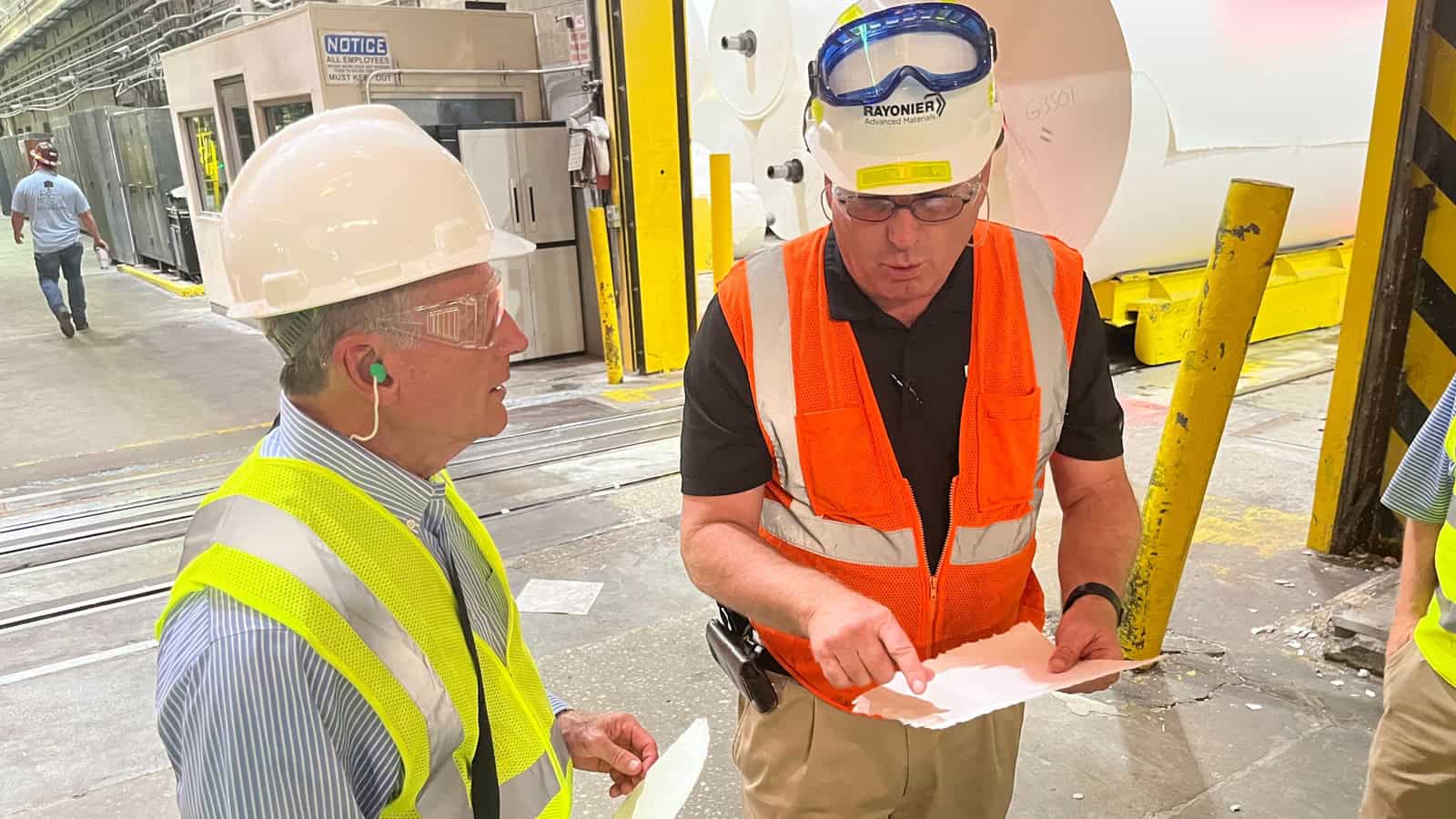
Rep. Earl L. “Buddy” Carter (R-GA), a staunch advocate for health care reform and a community pharmacist by profession, visited RYAM’s manufacturing facility in Jesup, Georgia, in August to discuss manufacturers’ health care and tax policy priorities.
During the visit, Rep. Carter emphasized the critical need for pharmacy benefit manager reform as well as tax policies that support manufacturers’ growth and competitiveness.
The visit: Clay Bethea, RYAM’s Jesup plant general manager and vice president of U.S. wood procurement, led Rep. Carter on a tour of the cellulose specialties manufacturer’s facility, where he observed how pulp is dried and finished into sheets and rolls. Bethea highlighted the significant challenges the company faces due to rising costs in health care, particularly those driven by PBMs, and the looming expiration of key tax provisions in 2025.
- “We are proud to be a part of this community, creating jobs and driving economic growth,” Bethea said. “However, the rising costs of health care, particularly due to PBMs, and the uncertainty around critical tax provisions like R&D expensing and accelerated depreciation, are growing concerns for both our business and our employees. Reforming PBMs and maintaining tax policies that allow us to invest for the future are crucial to our ability to remain competitive globally.”
PBM reform: Rep. Carter has long been vocal about the need to hold PBMs accountable for their role in inflating health care costs.
- “PBMs have become powerful middlemen, often driving up drug prices while squeezing independent pharmacies out of the market,” Rep. Carter said during the tour. “It’s time for Congress to bring transparency and fairness back to the system.”
- Carter has introduced and supported several pieces of legislation designed to reform PBM practices, including a bill aimed at delinking PBM compensation from drug prices, improving PBM payments to pharmacies and increasing transparency.
Tax challenges: In addition to health care, Rep. Carter addressed the pressing issue of preserving tax reform.
- “The expiration of accelerated depreciation, R&D expensing and favorable tax rates could significantly hamper the manufacturing industry’s ability to grow and remain competitive globally,” Rep. Carter warned.
- “These tax provisions have been crucial for manufacturers like RYAM, enabling them to make significant investments in their operations and workforce. Losing them would not only impact these companies’ ability to innovate but also jeopardize jobs and economic growth in communities across the country.”
NAM in action: The NAM has long advocated for both PBM reform and the preservation of essential tax policies that drive the manufacturing industry.
- “PBMs are a significant driver of the rising costs of health care, and reform is essential to ensure that manufacturers can provide affordable benefits to their workers,” said NAM Vice President of Domestic Policy Charles Crain.
- “Congress also needs to act with urgency to prevent devastating tax increases scheduled for next year that will impact manufacturers across the country.”
The state-level view: Lloyd Avram, president and CEO of the Georgia Association of Manufacturers, echoed Rep. Carter’s concerns.
- “Manufacturers across Georgia are facing unsustainable health care expenses, and the uncertainty surrounding federal tax provisions only adds to the challenges,” Avram said. “Action on PBM reform and tax policy is essential to helping our industry remain competitive and continue providing good jobs in our communities.”
The bottom line: “Reducing health care costs and increasing transparency in the PBM system are crucial steps in lowering the overall cost of doing business in the U.S.,” said Rep. Carter. “However, to truly compete in the global economy, it’s important that we preserve the policies that have empowered manufacturers to innovate, expand and sustain jobs. Otherwise, the U.S. risks becoming a less attractive place for manufacturing investment, ultimately threatening our economic leadership on the world stage.”
Rep. Johnson Talks Tax Policy at Smurfit Westrock
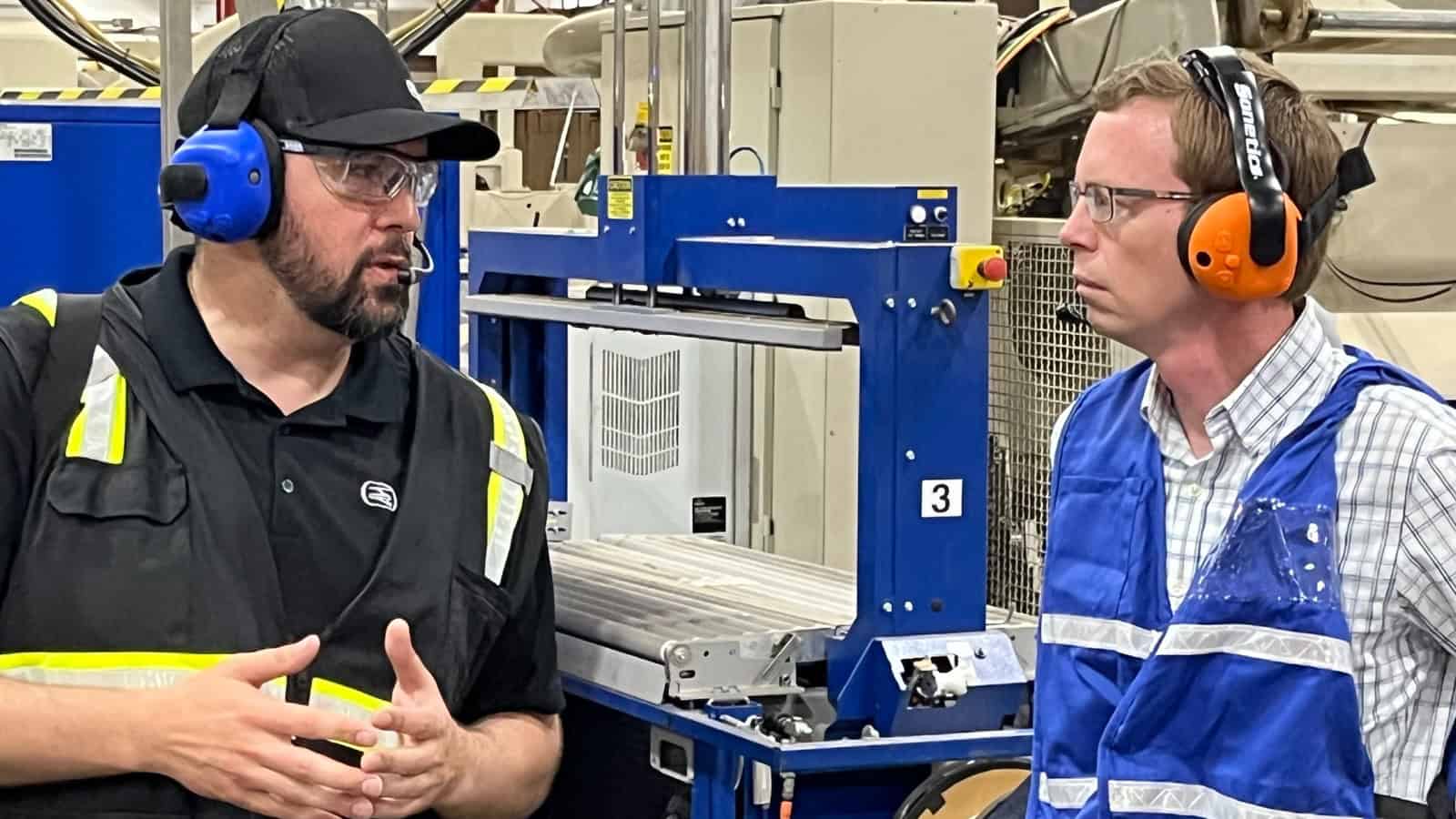
Rep. Dusty Johnson (R-SD) recently visited Smurfit Westrock’s facility in Sioux Falls, South Dakota, to speak with local business leaders and NAM representatives about the importance of maintaining pro-growth tax policies for manufacturers.
The tour: Smurfit Westrock Plant General Manager Gerald Loftin led Rep. Johnson through their state-of-the-art packaging facility, showcasing the company’s innovative solutions and highlighting its role as a major employer in the community, supporting local jobs and economic growth. Smurfit Westrock, a global leader in sustainable paper and packaging, operates in 40 countries with more than 500 packaging converting operations and 63 paper mills.
- “Smurfit Westrock’s success directly benefits the community, providing employment and contributing to the local economy,” Loftin said. “We are proud to be a part of this region and to support the growth and well-being of the area.”
The threat: NAM Vice President of Domestic Policy Charles Crain addressed the risks posed by expiring tax provisions. “Tax reform was rocket fuel for the manufacturing sector,” Crain explained. “It led directly to record levels of both job creation and wage growth in the years following the bill being signed into law.”
- Crain also emphasized the importance of preserving tax reform in full. “Essential tax reform provisions have already begun to expire—for example, full expensing, which has been crucial for our industry’s ability to invest in new equipment and expand operations, started phasing down last year,” Crain said. “Even more devastating changes are scheduled for 2025, the combination of which will significantly hamper manufacturers’ capacity to modernize and grow, directly impacting competitiveness and job creation.”
Calling on Congress: “Manufacturers are grateful to Rep. Johnson for supporting legislation earlier this year that would have revived immediate R&D expensing, a pro-growth interest deductibility standard and full expensing for capital investments,” Crain said. “We are looking to Congress for leadership and swift action as we work to prevent the harmful tax increases in store next year.”
Listening to manufacturers: Rep. Johnson emphasized his strong support for extending key tax provisions.
- “After seeing firsthand how these tax measures have benefited Smurfit Westrock and hearing about the negative impacts of their expiration, I’m more convinced than ever that we need to act swiftly to extend them,” he said.
- “Full expensing, R&D expensing and competitive tax rates are vital for the continued growth and innovation of our manufacturing sector. I’m committed to working with my colleagues in Congress to ensure we preserve these pro-growth policies before they expire, supporting jobs and economic development here in South Dakota and across the nation.”
The bottom line: “Extending the 2017 tax reform is not just a priority, it’s a necessity for maintaining America’s competitive edge in manufacturing,” Rep. Johnson concluded.
Get involved: Manufacturers interested in sharing their perspectives on tax reform with congressional leaders or hosting facility tours for U.S. legislators can find more information through the NAM’s “Manufacturing Wins” campaign.
NAM Member Testifies on Importance of Consistent Tax Policy before Ways and Means Committee
Washington, D.C. Today, Steve Sukup, President and CEO, Sukup Manufacturing Co., testified before the House Ways and Means Committee during a field hearing titled, “The Success of Pro-Growth, Pro-Worker Tax Policy in the American Midwest.”
Below please find his remarks as prepared for delivery:
Good morning Chairman Smith and to all the members joining us this morning.
Thank you for the opportunity to appear before you today at this important hearing. It’s a very special time for our community, and we are grateful to host you today.
My name is Steve Sukup, and I’m President and CEO of Sukup Manufacturing. We are located just up Interstate 35 in Sheffield, and I am proud to say that Sukup Manufacturing is the largest family-owned and operated manufacturer of grain storage, drying, and handling equipment.
For over sixty years, Sukup has been a critical part of the U.S. food supply chain here in the heartland. Our company is located in Congressman Feenstra’s district, and I’d like to thank him for being here today.
The tax reform bill of 2017 was a shot in the arm for manufacturers across our sector. Sukup has grown over the past several decades, but nothing compares to when the Tax Cuts and Jobs Act was signed into law.
For example, thanks to the lowering of the corporate rate to 21%, Sukup grew our workforce by a third, adding roughly 200 well-paying manufacturing jobs to our community.
The key to Sukup’s success has not only been our culture, but our dedication to creating and pushing our industry forward. Sukup has held over 100 U.S. patents. We are pioneering ways to make grain storage and drying more safe, profitable, and efficient for farmers and ranchers across the country.
This is largely made possible by our massive investments in research and development. In the years following tax reform, Sukup increased our R&D investment by several million dollars, with 95% of that money going towards engineering and staff wages, bringing well-paying jobs to Iowa.
One of these critical R&D investments is our Safe T Homes®. When a catastrophic earthquake struck Haiti in 2010, Sukup’s Safety Manager wanted to develop an efficient, quick-assembly home from one of our grain bins to provide relief. I encouraged him to build a prototype, and today, our Safe T Homes®, as you saw on the fair ground today, are changing lives worldwide.
We also developed the world’s largest 2.2-million-bushel bin for ethanol plants. That is big enough to house a Boeing 767, but yes, the landing is difficult.
Unfortunately, after being part of our tax code for seventy years, the expiration of immediate R&D expensing has made it harder for us to invest in the technologies and products of the future. Congress should reinstate the immediate expensing of R&D so manufacturers like Sukup can continue to innovate.
Following the passage of the 2017 tax law, Sukup went from roughly $5 million in capital spending to almost $15 million, thanks to 100% accelerated depreciation. This allowed us to fund new equipment purchases and fulfill our mission of providing Sukup employees with reliable, safe, and efficient equipment.
Unfortunately, full expensing began to expire in 2023. We believe that was a mistake, as it is common sense that our tax code should encourage investments that leads to growth.
Many manufacturing teams, including our company, would benefit from seeing this provision restored, and Congress should do so immediately.
An accountant once told me, if you don’t have debt, that means you’re not coming up with new ideas. Many manufacturers like us borrow funds to finance essential long-term investments.
Tax reform made it less expensive to take out business loans, which manufacturers use to invest and grow their operations. Unfortunately, this pro-growth standard expired in 2022 as well, making debt financing much more expensive.
We are also counting on you to preserve tax reform’s sensible changes to the estate tax, so that I can ensure the third and fourth generations of Sukups can continue in our family business.
Discussing tax policy before Congress is something of tradition in our family. About 20 years ago, my father Eugene Sukup testified before the Senate Finance Committee, along with Warren Buffett.
Since then, thanks to tax reform, we have had an incredible growth streak in our business, and every one of our employees and customers has benefited. I urge you to help us keep that growth streak going. Maintaining the 21% corporate rate, as well as the tax provisions I just described, is so important to manufacturers everywhere.
Because of these policies, we’ve been able to not only maintain our business, but to provide a great living, health benefits, and soon expanded childcare for our employees and the community—even as we aid those in need around the globe.
Again, thank you for being here today, and thank you for looking at ways to keep Sukup Manufacturing a rural Iowa success story.
-NAM-
The National Association of Manufacturers is the largest manufacturing association in the United States, representing small and large manufacturers in every industrial sector and in all 50 states. Manufacturing employs nearly 13 million men and women, contributes $2.89 trillion to the U.S. economy annually and accounts for 53% of private-sector research and development. The NAM is the powerful voice of the manufacturing community and the leading advocate for a policy agenda that helps manufacturers compete in the global economy and create jobs across the United States. For more information about the NAM or to follow us on Twitter and Facebook, please visit www.nam.org.
Corporate Tax Rate: A Q&A with Rep. Carol Miller
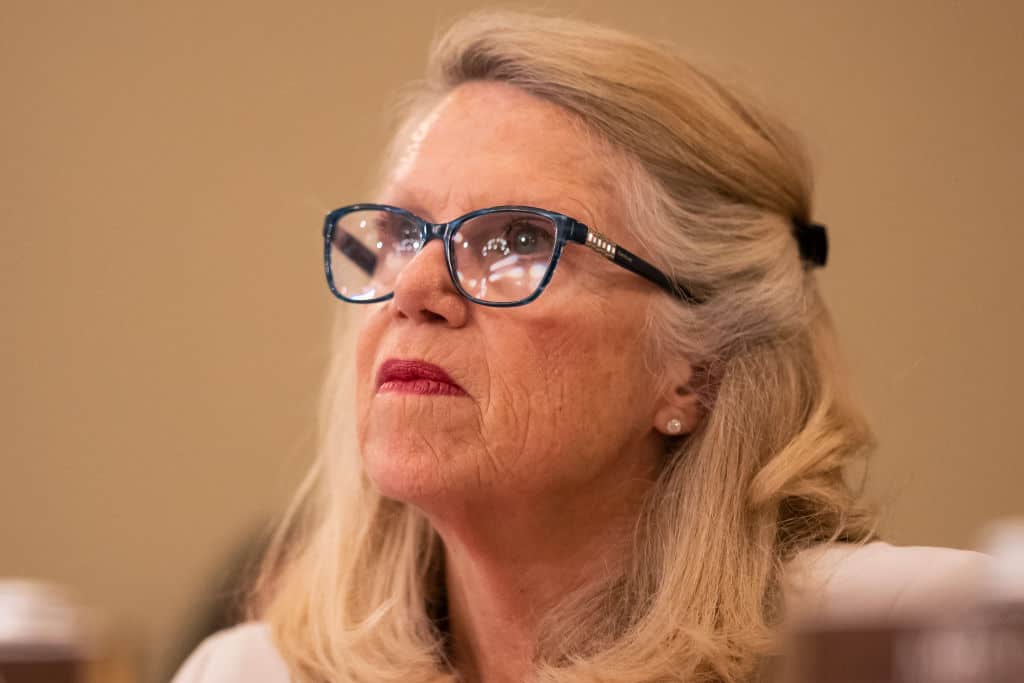
The NAM recently talked to Rep. Carol Miller (R-WV), the head of the House Ways and Means Committee’s Supply Chain Tax Team, about how raising the corporate tax rate would “devastate” manufacturers, and what she and her colleagues in Congress are doing to keep it where it is.
NAM: Rep. Miller, Congress is facing a “Tax Armageddon” next year, as crucial provisions from 2017’s Tax Cuts and Jobs Act are set to expire. As the leader of the Ways and Means Supply Chain Tax Team, what is your focus moving into next year’s debate?
Miller: In all the meetings I have with Fortune 500 companies, small businesses and stakeholders, it’s clear that the corporate rate is top of mind for everyone. We are all concerned that if the corporate rate is raised from 21%, consumers will be hit the hardest by the rising prices of everyday goods and services. I know for capital-intensive industries like mining, having a consistent tax rate is essential. I’m also focused on how energy tax credits are implemented and making sure that the government isn’t picking winners and losers by their rulemaking. During the reauthorization, my Supply Chains Tax Team will be evaluating the various energy credits currently in law to see what works and what needs tweaking.
NAM: Prior to 2017, the United States’ corporate tax rate was 35%, the highest in the OECD and third-highest in the world. Tax reform lowered the rate to 21%, aligning the U.S. with the average rate elsewhere in the OECD. What does it mean for Congress to protect this lower rate, and what would happen if it goes up?
Rep. Miller: If the corporate rate goes up, it would be devastating for every American, from the small business owner to the CEO who is trying to expand their business. The corporate rate rising means there will be higher prices while the U.S. struggles to compete on the global scale. The best thing we can do in Congress is cement the corporate rate at 21%—or better yet, lower it even more—through the TCJA reauthorization in 2025.
NAM: In 2018, the year the 21% corporate rate took effect, manufacturers created more than 260,000 jobs (the best year for job creation in 21 years) and increased wages by 3% (the best year for wage growth in 15 years). What else is the Supply Chain Tax Team seeing on the impact of the corporate tax rate as they visit with businesses around the country?
Rep. Miller: We’ve only seen positive impact from the corporate rate being lowered. When the pandemic hit and the markets were falling due to uncertainty and instability, the lower corporate rate gave companies more flexibility to help their employees and keep costs low instead of paying the government sky-high taxes. The lower corporate rate protected jobs, helped produce more economic growth and makes all the difference for American families who are struggling with inflation. Furthermore, the lower rate led to higher federal revenues since companies were able to expand and invest so heavily following the passage of the Trump Tax Cuts.
NAM: Thank you for being a champion for manufacturers across the country. What can our members do to stay involved and be a resource for your tax team’s work?
Rep. Miller: Spread the word to those who might not know why the corporate rate is so important. The majority of Republicans are on the same page about this, but some think that in order to bring down inflation, you need to raise taxes on businesses. That is not true. Prices only go down if costs for companies go down, and the corporate rate is an effective way to do that while simultaneously boosting the American economy.
Rep. Miller: Keep Corporate Tax Rate Low
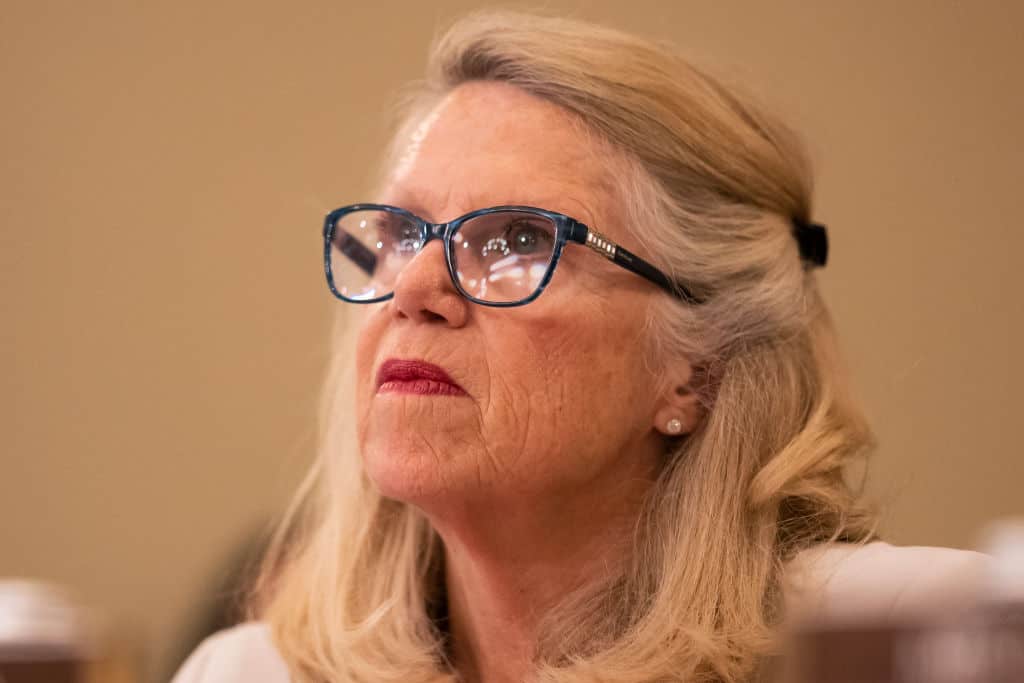
Unlike many other pro-growth tax reform provisions, the corporate tax rate isn’t set to expire at the end of 2025, but some policymakers and President Biden have proposed increasing it.
The NAM recently talked to Rep. Carol Miller (R-WV), the head of the House Ways and Means Committee’s Supply Chain Tax Team, about how raising the corporate tax rate would “devastate” manufacturers, and what she and her colleagues in Congress are doing to keep it where it is.
“Devastating for every American”: Raising the corporate tax rate from its current, competitive 21% rate would be ruinous, Rep. Miller said. She’s focused on preventing that from happening.
- “If the corporate rate goes up, it would be devastating for every American, from the small business owner to the CEO who is trying to expand their business,” Rep. Miller told us. “The corporate rate rising means there will be higher prices while the U.S. struggles to compete on the global scale. The best thing we can do in Congress is cement the corporate rate at 21%—or better yet, lower it even more—through the [2017 Tax Cuts and Jobs Act] reauthorization in 2025.”
- Prior to tax reform, the U.S. had the highest corporate tax rate in the Organisation for Economic Co-operation and Development at 35%, and the third-highest rate in the entire world, harming America’s ability to attract manufacturing investment.
The effect of 21%: Rep. Miller emphasized that the U.S. economy has “seen only positive impact from the corporate rate being lowered.”
- “When the pandemic hit and the markets were falling due to uncertainty and instability, the lower corporate rate gave companies more flexibility to help their employees and keep costs low instead of paying the government sky-high taxes,” she went on. “The lower corporate rate protected jobs, helped produce more economic growth and makes all the difference for American families who are struggling with inflation.”
- In 2018, the year the 21% rate took effect, manufacturers created more than 260,000 jobs and were able to raise wages by 3%, the fastest pace in 15 years.
What manufacturers can do: To help preserve the 21% corporate tax rate, manufacturers should be vocal about its importance to the U.S. economy.
- “Spread the word to those who might not know why the corporate rate is so important,” Rep. Miller concluded. “Some think that in order to bring down inflation, you need to raise taxes on businesses. That is not true. Prices only go down if costs for companies go down, and the corporate rate is an effective way to do that while simultaneously boosting the American economy.”
Get involved: The NAM’s “Manufacturing Wins” tax campaign gives manufacturers the opportunity to share their tax reform stories with policymakers. You can join the campaign at www.NAM.org/MfgWins.
Learn more: Our full interview with Rep. Miller is available here.
Timmons: Industry Resilient, but Action Needed
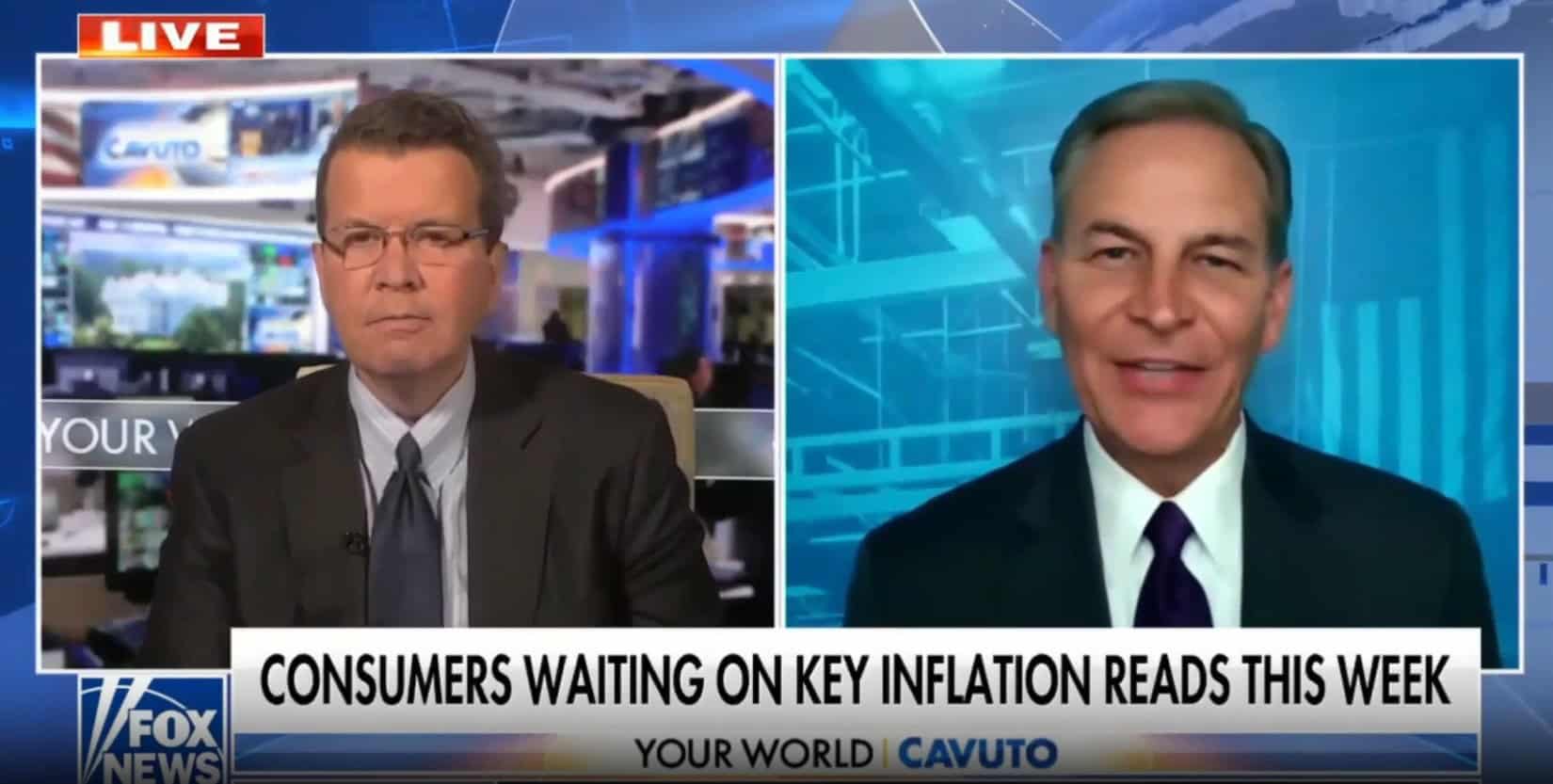
Despite mixed market signals in recent weeks, the U.S. economy is strong and manufacturing is resilient—but Congress must take certain steps to maintain the industry’s competitiveness, NAM President and CEO Jay Timmons told Fox News host Neil Cavuto Monday.
What’s going on: When lawmakers return from their August recess next month, they should prioritize several tax provisions, Timmons said.
- “When … Congress goes back, we’ve got to deal with interest deductibility, and we’ve got to deal with the research-and-development tax deduction,” he continued. “We’ve got to deal with full expensing. Those are things that have expired.” These measures and others are top priorities in the NAM’s tax campaign, Manufacturing Wins.
- Other manufacturing-critical tax provisions are scheduled to expire or be reduced drastically at the end of next year, including the pass-through and estate-tax deductions. What’s more, “candidates on both sides of the aisle … are talking about raising taxes on businesses,” Timmons said. Individual tax rates and tax rates on manufacturers that operate globally are also set to rise at the end of 2025.
Regulatory onslaught: Manufacturers are also struggling with a “regulatory burden that is driving up the cost of doing business,” Timmons told Fox News.
- “We have restrictions on our ability to develop energy sources here, and we have a ban on exports of natural gas. All of those things lead to potential downsides in the economy.”
- The vast majority of Americans support exporting natural gas, a March NAM poll found, but the Biden administration’s indefinite pause on permits to export liquefied natural gas, imposed in January, continues.
Hopeful outlook: “There is a … very positive sense among manufacturers that if we do the right things on the policy front, we’re going to continue [the] expansion in the sector,” Timmons added. “We’re going to continue the record investments that we’ve seen, the record job growth and the record wage growth in the sector.”
The Corporate Tax Rate, Explained
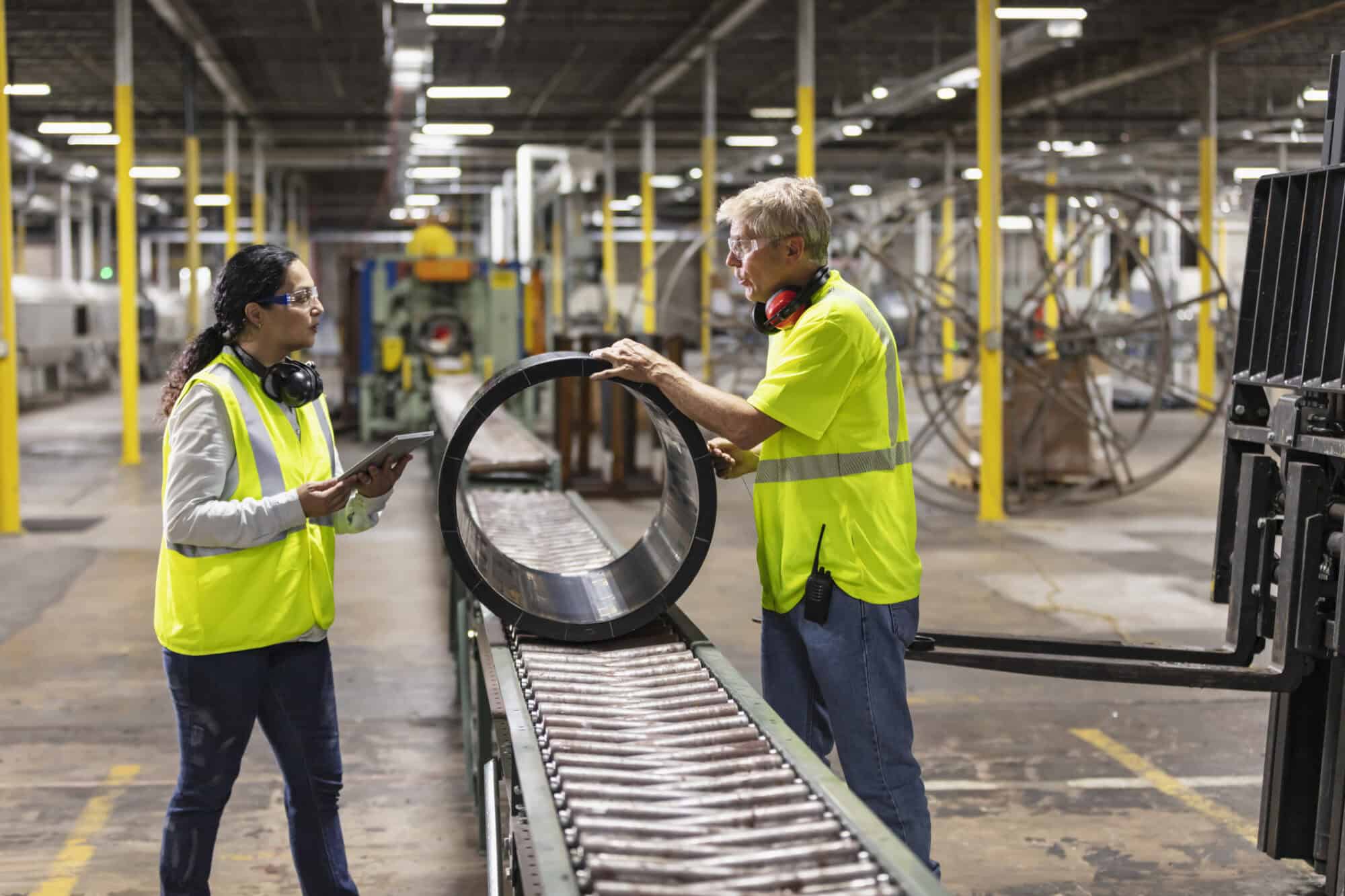
The NAM’s 2025 tax campaign, “Manufacturing Wins,” is focused on preserving tax provisions critical to manufacturing in the U.S. One of those is the corporate tax rate, which the 2017 tax reform lowered from 35% to a globally competitive 21%.
The NAM recently released a tax explainer on the current corporate rate, emphasizing why it’s crucial to U.S. manufacturing’s competitiveness on the world stage.
The background: Prior to 2017, the U.S. corporate tax rate was 35%, the highest among our peers in the Organisation for Economic Co-operation and Development and the third-highest rate in the entire world—making the U.S. an outlier and harming its ability to attract manufacturing investment.
- Tax reform lowered the corporate rate to 21%, aligning the U.S. with the average rate elsewhere in the OECD.
The benefits: Reducing the tax burden on manufacturers led to increased investment throughout the U.S., job creation, wage growth and overall economic expansion.
- In 2018, the year the lower rate took effect, manufacturers had their best year for job creation in more than two decades, creating more than 260,000 positions and increasing wages by 3%—the fastest pace in 15 years.
- NAM surveys conducted prior to tax reform found that nearly 80% of manufacturers were struggling with unfavorable business conditions like high taxes—a figure that dropped to just 12% following the reduction in the corporate rate.
What’s at stake: Although the corporate tax rate is not set to expire at the end of 2025, as other pro-growth provisions are, President Biden’s fiscal year 2025 budget called for an increase to 28%.
- This proposal would return the U.S. to one of the highest corporate tax rates in the developed world, resulting in fewer jobs, lower wages, less innovation and reduced investment in our communities.
What should be done: “Manufacturers are calling on Congress to preserve tax reform in its entirety—including the 21% corporate tax rate,” the NAM said.
- “Congress should maintain a globally competitive corporate rate—enabling manufacturers to continue leading on the world stage while driving innovation and job creation here at home.”
Small Manufacturers: Save the Pass-Through Deduction
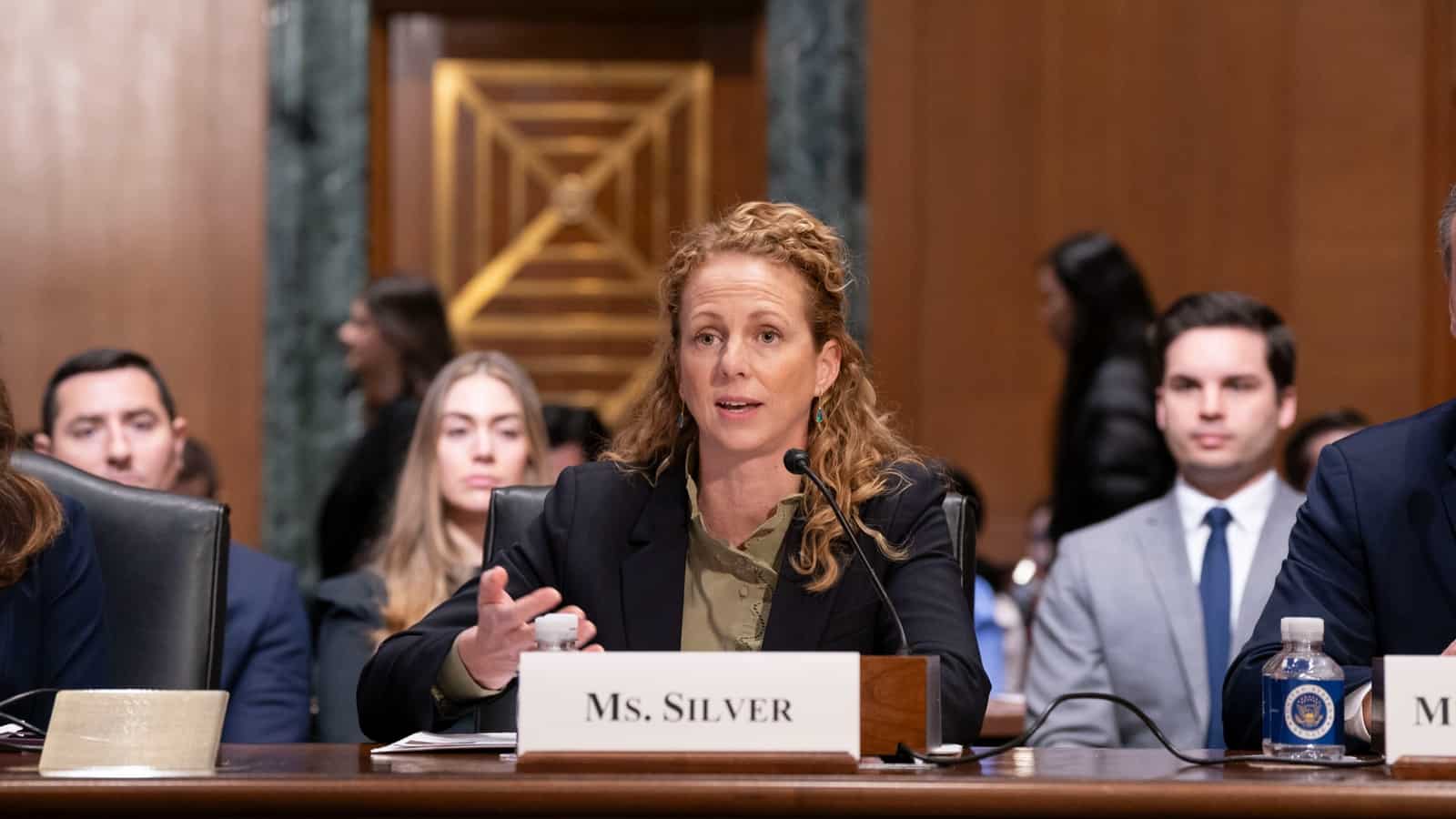
A critical tax deduction for small businesses is set to expire at the end of 2025, and manufacturers are sounding the alarm as part of the NAM’s “Manufacturing Wins” tax campaign.
Increasing the tax burden: Courtney Silver, president and owner of Concord, North Carolina–based Ketchie, recently emphasized the importance of the pass-through deduction. As an S corporation, Ketchie is one of the many small manufacturers that are eligible for this 20% deduction created by the Tax Cuts and Jobs Act.
- Silver, who chairs the NAM’s Small and Medium Manufacturers Group, warned that the expiration of this provision, along with the planned increase in individual tax rates, will “dramatically increase the tax burden on small manufacturers like Ketchie.”
Decreasing competitiveness: The disappearance of the pass-through deduction would make American companies less competitive on the world stage, predicted Austin Ramirez, president and CEO of Husco, a Waukesha, Wisconsin–based maker of hydraulic and electromechanical components for on- and off-highway vehicles.
- “The loss of the TCJA’s small business provisions would severely hamper our growth trajectory,” he said.
- “The combination of an increased tax rate and the loss of the pass-through deduction would be especially damaging, tilting the playing field against Husco and other pass-through manufacturers.”
Damaging supply chains: “Many small manufacturers are organized as pass-throughs, including most of [our] key suppliers,” said Chuck Wetherington, president of BTE Technologies in Hanover, Maryland.
- “A tax increase on pass-throughs would have a damaging, disproportionate impact on the manufacturing industry.”
Discouraging entrepreneurs: Competitive tax policy is personal for small manufacturers like Hannah Kain, who founded ALOM Technologies out of Fremont, California. “Like many immigrants before me, I came to the U.S. for opportunity,” Kain said.
- “Since I started the company in 1997, we have reinvested every dollar we made into growing the company. … I personally see how hard it is for entrepreneurs—and especially minorities—to start the type of company that must make big investments in equipment, space, inventories and so much more.”
Reducing growth: “[The 2025 tax hikes] will affect manufacturing businesses like ours and make it more difficult for us to hire more employees, raise wages and drive growth for our business,” said Lee Dougherty, a mechanical engineer at Madsen Steel.
- “We need our representatives in Congress to do their part by stopping these tax hikes so that we can continue to invest in our community and the future of our business.”
What you can do: Manufacturers willing to share their own stories about the need to preserve key tax reform measures can visit NAM.org/MfgWins or email the NAM’s tax team to get involved.
Daines, Smucker Staffers Talk Pass-Through Deduction

What’s going on: On Thursday, as part of its 2025 tax campaign, “Manufacturing Wins,” the NAM hosted Noelle Britton, deputy chief of staff for Rep. Lloyd Smucker (R-PA), and Caroline Oakum, tax counsel for Sen. Steve Daines (R-MT), in a virtual roundtable to discuss what’s being done in Congress to maintain the Section 199A pass-through deduction.
- The 20% deduction—created by the 2017 Tax Cuts and Jobs Act to help the many small and medium-sized businesses in the U.S.—is among several vital tax provisions scheduled to expire at the end of 2025. (Pass-throughs are companies whose profits are “passed through” to the owners, who then pay taxes on the entities’ incomes on their personal tax returns.)
- Both Rep. Smucker, who leads the House Ways and Means Main Street Tax Team, and Sen. Daines are leaders of legislation that would make the deduction permanent.
What they’re doing: Sen. Daines introduced the Main Street Tax Certainty Act in the Senate last May, while Rep. Smucker introduced the House’s version of the measure last July.
- The legislation would make the pass-through deduction permanent, providing much-needed certainty to the small and medium-sized manufacturers that have relied on it to increase investments and job creation.
What you can do: The House Ways and Means Committee Tax Teams are collecting companies’ perspectives on how the pass-through deduction has helped manufacturers and other businesses. Similarly, the NAM is collecting stories that can be used as part of our Manufacturing Wins tax campaign.
- Manufacturers willing to share their own stories about the pass-through deduction can email [email protected] or contact the NAM’s tax team.
